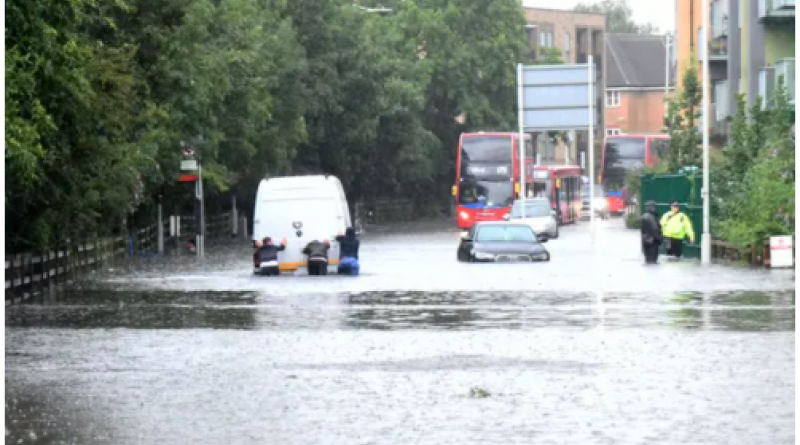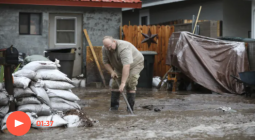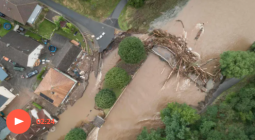Flash floods will be more common as climate crisis worsens, say scientists

Overhaul of UK infrastructure needed to ensure it is not overwhelmed by impact of extreme weather
Flash flooding of the type seen in London this weekend will become a more common occurrence as the climate crisis worsens, scientists have warned, and the UK government, businesses and householders must do much more to protect against future harm.
Dr Jess Neumann, a hydrologist at the University of Reading, said: “Flooding from intense summer rainfall is going happen more frequently. No city, town or village is immune to flooding and we all need to take hard action right now if we are to prevent impacts from getting worse in the future.”
Climate policy in the UK has focused on cutting greenhouse gas emissions, which is a primary concern, to reduce the human impact on the climate and ensure global heating does not reach catastrophic levels. But the government has also been warned frequently that measures to cope with the impacts of extreme weather are urgently needed, and that the UK has been falling behind on such adaptive measures.
Adapting to the impacts will require a thorough overhaul of the UK’s infrastructure, encompassing not only drainage and water supply systems, and transport, to ensure they are not overwhelmed, as many in London were at the weekend, but also energy supply and communications networks.
Buildings will need to be redesigned and public areas revamped to include better drainage channels and storm drains, while more innovative approaches could include porous pavements. A lack of green spaces and vegetation, and the paving over of many areas without heed to flood risk, has compounded the problem in many cities, including London, and also needs to be addressed, experts warned.
Neumann said: “Planning and development need to consider flood risk from all sources – river, groundwater and flash floods – and adapt accordingly. It is not acceptable to keep paving over the land and expect the public to deal with the water when it comes into their homes.”
One of the problems is that responsibility for flood protection in the UK is split among many authorities, with little central oversight. Liz Stephens, associate professor of climate resilience at Reading University, said: “The UK still has a complicated set of roles and responsibilities for surface water flooding risk. Lead local flood authorities take responsibility for managing it, the Environment Agency for mapping it, and the Met Office for providing early warning. This makes it difficult for the public to have a good understanding of their own risk and what can be done.”
She said there was a lack even of basic data, caused by a refusal to invest in more precise research. “The surface water flood hazard maps for the UK have not been improved since 2013. These urgently need updating. The current accuracy of surface water flood maps reflects an investment choice and not what is possible with the state-of-the-art science,” she said.
“It is difficult to help people prepare for surface water flooding if they don’t know they are at risk, and if they don’t receive precise warnings of the likely impacts when heavy rain is forecast.”
Parliament’s public accounts committee warned earlier this year that the government was not doing enough to prevent damage from flooding, and said councils and local authorities needed much more help, including more cash.
Meg Hillier, the chair of the committee and a London MP, told the Guardian the weekend’s floods highlighted the government’s inaction. “This latest flooding underlines the committee’s concerns about the resources available for floods which are becoming more frequent,” she said. “Flash flooding from torrential rain causes havoc for those affected and yet the lack of resources for councils, which are responsible for the mitigation of urban flooding, is hampering the response which businesses and householders so desperately need.”
Darren Rodwell, environment spokesperson at the Local Government Association, which represents councils, echoed her call: “Councils are best placed to ensure that flood defence money is directed towards projects that best reflect local needs, including protecting key roads and bridges to keep local residents and businesses moving. Funding for flood defences needs to be devolved to local areas and sit within a new national framework for addressing the climate emergency.”
Sadiq Khan, the mayor of London, said his powers were limited on flood defences, but he was dealing urgently with Thames Water on the issue. “We are seeing increasing incidents of extreme weather events linked to climate change,” he said. “This is not the first time in recent weeks that London has been hit by major flooding. Despite having limited powers in the area, it remains a key priority for myself and London’s council leaders that more is done urgently to tackle flooding and the other impacts of climate change. This includes continuing to urge Thames Water to address localised issues with infrastructure that may exacerbate the impact of flooding.”
Insurers are among those most concerned about the impacts of climate breakdown, and have warned that UK households and businesses in some areas could find themselves uninsurable if stronger action is not taken.
Adam Winslow, the chief executive of Aviva General Insurance, said: “It’s too late to stop the effects of climate change from happening, but we can reduce the impacts it will have on our lives. Action is needed now to improve regulation about where and how properties are built, encourage the use of resilient materials, and consider innovative and natural solutions to climate change.”
26 July 2021
The Guardian





